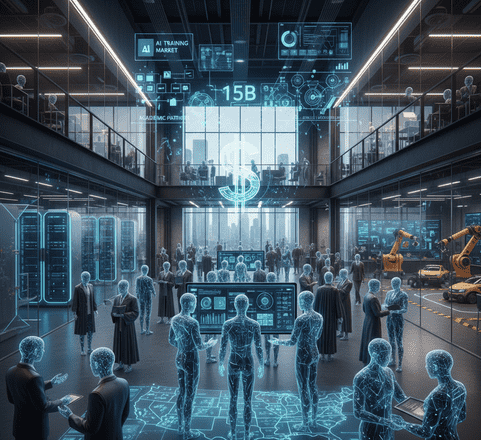Internships Reinvented: Virtual, Global, AI-Powered—and What This Means for the Future of Work
Did You Know?
Internships have reached far beyond your city or your calendar; they’re virtual, global, and now driven by AI skills, transforming from résumé fillers into powerful learning engines. (Source)
From traditional desk duties to impactful, skill-based work, this shift marks a broader transformation, one that professionals, organizations, and job seekers alike must understand deeply. So, what’s next in this brave new world of internships? Let’s dive in.
Virtual Internships Go Mainstream: Geography Becomes Irrelevant
Internships used to be local, hierarchical, and often involved generous amounts of grunt work. No more. Today, they’re conducted remotely, powered by tools that keep interns connected, engaged, and productive from anywhere. That means greater access, especially for talent in smaller towns or those balancing multiple responsibilities.
What can professionals learn?
- Remote collaboration skills are now non-negotiable.
- Managers must design structured virtual programs, from onboarding to performance checkpoints, to replace physical oversight.
- Tools like Slack, Zoom, and Asana are the backbone of modern internships.
If you’re interested in how leaders make better decisions using AI tools, check out AI for Better Decision Making: A Guide for Leaders.
Truly Global Talent Pools: Breaking Borders with Opportunity
Internships today are open to a global audience. Students from Pune can intern with London startups. Hyderabad grads can collaborate with Toronto nonprofits. Borders have dissolved.
- Companies can tap diverse thinking and broaden their innovation pipelines.
- Interns develop cross-cultural communication skills and gain global perspectives, which enhance their later performance and adaptability.
Skill-Based Internships: AI Does Routine, Humans Add Value
With AI increasingly handling repetitive tasks, internships now emphasize AI-augmented contributions, critical thinking, problem-solving, and creative collaboration.
- Interns are longer filing files and designing workflows, building dashboards, and analyzing insights.
- Institutions must rethink learning outcomes, blending AI tools with human judgment.
Moreover, understanding this model can help you mentor future talent more effectively, guiding interns to focus on tasks where human insight still matters most.
Challenges Ahead: Access, Engagement, and Equity in the Virtual Era
This revolution isn’t without its pitfalls:
- The digital divide remains real; unequal access to devices and reliable internet can shut out deserving talent.
- Engagement levels vary—without in-person bonding, interns may feel isolated or lose motivation.
- Ethical use of AI is essential; interns must learn not just what to do, but how responsibly to do it.
Organizations and educators must address these gaps deliberately, equipping interns with not just tools, but also context, support, and oversight.
What Professionals & Organizations Should Take Away
- Redesign internship programs with remote-first, skill-structured models.
- Upskill managers to guide interns through AI-augmented tasks.
- Ensure inclusivity by providing lending devices, coverage, or infrastructure support when needed.
- Embed ethical standards in AI use: document transparency, bias awareness, and responsible reporting.
- Measure outcomes differently, tracking learning, creative outputs, and cross-cultural collaboration, not just hours logged.
For a deeper look at how AI can elevate education and career training, explore Transforming America’s Future Through Artificial Intelligence: A Comprehensive Look at the April 2025 Executive Initiative to Advance AI Education for American Youth.
Job-Market Impact: Entry-Level Roles Evolve, Not Disappear
According to recent findings, entry-level jobs that were once gateways into the professional world are now being automated or transformed—not vanished, but reborn. Simultaneously, surveys show that while many Gen Z interns believe AI will automate around 20% of their future roles, nearly 92% feel confident in adapting. (Source)
Insights for job seekers-
- Relying on AI to routinize tasks is no longer enough; you must demonstrate creative problem-solving, judgment, and adaptability.
- Employers are increasingly preferring AI experience over traditional credentials, where skill helps earn recognition.
Gen Z’s Perspective: Confidence Mixed with Pressure
Gen Z is often praised as digital natives, but with that comes “AI shame”: many interns feel they must hide their use of AI or pretend they’re experts to avoid judgment. In one survey, nearly 89% use AI at work, yet 62% conceal their usage, and 55% pretend to know tools they don’t, largely because structured training is lacking. (Source)
The impact it has-
- Organizations must normalize real AI learning, offering safe spaces to experiment, fail, and grow.
- Formal training in AI literacy is now critical for interns and entry-level employees alike.
The New Career Path: AI Certification + Soft Skills = Future-Ready Talent
The winds are shifting. Employers increasingly value AI professional certification and verified competence over just degrees. Gen Z craves industry-recognized credentials, from AI skills fundamentals certificates to generative AI for software development skill certificates that give them tangible proof of capability. (Source)
By embracing artificial intelligence training and pursuing the best AI certification, individuals can signal readiness for modern job roles. The value of AI certification benefits isn’t abstract; it’s a real wage and placement advantage.
Blog suggestions:
- Want to learn how AI certificates help you stand out? Read How AI Certifications Can Get You Industry Recognition.
- Curious about trends powering the future of AI? Check out the blog – Mary Meeker AI Trends You Must See.
What This Means for the AI Career Path
If you’re building an AI career path, this is your moment:
- Start with foundational AI skills like critical thinking, ethical awareness, and tool fluency.
- Consider targeted certification, such as a generative AI for software development skill certificate or an AI skills fundamentals certificate.
- Align your training with real-world use cases like internships, micro-projects, and global collaborations.
- Complement technical knowledge with soft skills, creativity, and judgment.
Why AI CERTs®’ AI Essentials Certification Matters
In a world where virtual, global, AI-powered internships are becoming the norm, and where skill-based hiring is upending traditional qualifications, organizations and individuals need a simple truth: certification is essential.
The AI Essentials Certification from AI CERTs® offers:
- A solid foundation in AI professional certification and top AI skills.
- Proof of competency via the best AI certification standards.
- A credible AI career path launching pad.
- Real AI certification benefits like employability, credibility, and confidence.
Whether you’re designing internship programs, mentoring Gen Z talent, or steering your own professional journey, embracing this certification can be the difference between getting left behind and leading the AI-empowered future.
Summary at a Glance
| Stakeholder | Key Takeaway |
| Professionals/Organizations | Redesign internships for remote, AI-augmented, inclusive models |
| Students/Gen Z interns | Seek AI skills training, certifications, and projects, and build soft skills |
| Employers/HR | Value AI literacy, provide structured training, and reevaluate hiring around demonstrated capabilities |
| Everyone entering the AI career path | Blend AI tools proficiency with judgment, creativity, and soft skills, and get certified with recognized credentials |
Curious to explore certification paths or need help designing internship programs with AI in mind? Consider contacting us; our team will walk you through 50+ certifications and help you pick what aligns with your background.
Recent Blogs

FEATURED
What U.S. Organizations Can Teach European Partners About AI Training Mandates
February 9, 2026
FEATURED
Leveraging AI Training Partnerships to Address Workforce Displacement Fears in Europe & America
February 9, 2026
FEATURED
Why AI Governance & Literacy Must Be at the Heart of University Curricula and Corporate Learning
February 7, 2026
FEATURED
Why the AI Instructor Shortage Is a Strategic Opportunity for Partners
February 7, 2026
FEATURED
The $15B U.S. AI Training Market- Where Enterprise & Academic Partners Fit In
February 7, 2026

